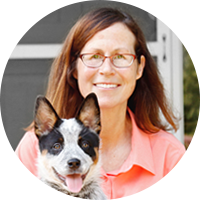April 28, 2011
I took my Australian Shepherd/ Rott to a dog Psychologist because he was nipping at people's ankles. They put him on Prozac, but there has to be some other way to deal with this.
Full Question:
I have a Australian Shepard/Rottweiler mix dog, he was born without his right eye. I picked up from the pound because the previous owners other dogs were too aggressive towards him. I was married when I got him and my ex-husband was not very nice to him, I never saw him hit Jack but Jack would stay down stairs until I got home. Shortly after my husband left me Jack started nipping at peoples ankles. He would sneak up behind them nip and run with his tail between his legs. When I'm not home he doesn't show any of these problems, my sister watches the house and he doesn't do anything to her or her company, so it only happens when I'm home.Now he is very well trained he follows my commands (site, stay, come, go lay down) I can have him in my back yard without a leash and he stays with me and comes when called. I've talked to a "dog Psychologist" and we tried some training were I would try to scare him then reassure him he was okay, the problem with that is he doesn't do anything to me, it's only when I have company. We decided to put him on Prozac, that seemed to calm him down from the biting, I left him on it for 3 months and now I'm trying him off the pill. I now have a boyfriend and Jack has been great with him, however for some reason he bite him in the ankle when my boyfriend moved to fast.
I'm at a lost as to what to do with him, I love him so much and don't want to put him to sleep, there's got to be something to help him with this behavior
Thank you for any help you can give
Laura

 Ed's Answer:
Ed's Answer:
You only confirm something I tell a lot of people and that is that the vast majority of so called behaviorists lack experience on aggression, which results on stupid bad advice being passed out.
Drugs are always a stupid fix.
Fear biters need structure in their lives. They feel most comfortable when they are very familiar with what's going to happen. They also feel most comfortable when they have a strong pack leader that makes decision (which you are not). Your dog sticks with you and does the things you ask for this reason.
To allow this dog to be around strangers is a fatal handler mistake. The dog should be in a dog crate when you're gone and people should not be handling this dog. An adult dog can easily be in a crate all day (they are in the crate all night).
With all this said – every instance of unwarranted aggression needs to have a serious correction. This means that it’s a correction that the dog remembers. It has to be a correction that the next time it thinks about doing this it remembers the severity of the correction and thinks "OH NO I DON’T WANT THAT AGAIN." When dogs understand this concept they settle and respect the handler.
I have two DVDs that help dog owners understand the correct way to train for this:
Basic Dog Obedience -- this training needs to be done with a dominant dog collar
Dealing with Dominant and Aggressive Dogs.
Drugs are always a stupid fix.
Fear biters need structure in their lives. They feel most comfortable when they are very familiar with what's going to happen. They also feel most comfortable when they have a strong pack leader that makes decision (which you are not). Your dog sticks with you and does the things you ask for this reason.
To allow this dog to be around strangers is a fatal handler mistake. The dog should be in a dog crate when you're gone and people should not be handling this dog. An adult dog can easily be in a crate all day (they are in the crate all night).
With all this said – every instance of unwarranted aggression needs to have a serious correction. This means that it’s a correction that the dog remembers. It has to be a correction that the next time it thinks about doing this it remembers the severity of the correction and thinks "OH NO I DON’T WANT THAT AGAIN." When dogs understand this concept they settle and respect the handler.
I have two DVDs that help dog owners understand the correct way to train for this:
Basic Dog Obedience -- this training needs to be done with a dominant dog collar
Dealing with Dominant and Aggressive Dogs.
71% (5 out of 7)
respondents found this answer helpful


Can't find what you're looking for?








